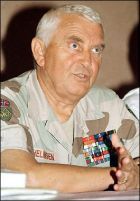Nuba Mountains ceasefire implementation perfect:JMC
KHARTOUM, Sept 20 (AFP) — The chairman of a commission overseeing a 2002 ceasefire agreement between the Sudanese government and the southern rebel Sudan People’s Liberation army (SPLA) in the Nuba Mountains said the two parties were “fully” observing the agreement.
 No clashes had taken place between the two sides since the signing of the agreement in Switzerland in January 2002, said the Joint Military Commission/Joint Monitoring Mission (JMC/JMM).
No clashes had taken place between the two sides since the signing of the agreement in Switzerland in January 2002, said the Joint Military Commission/Joint Monitoring Mission (JMC/JMM).
Some 150,000 people, according to World Food Programme estimates, have returned home, living conditions have improved and humanitarian aid is accessible, Brigadier General Jan Erik Wilhelmsen said in a press briefing here.
He outlined his JMC/JMM duties, according the ceasefire agreement, as including assisting the two parties in implementing the agreement, serving as a dispute resolution mechanism and assisting in confidence building.
The operation of the international body is funded by European countries, the United States and Canada, said Wilhelmsen, noting that each six-month mandate costs approximately nine million US dollars.
The agreement has until last July, been renewed five times and so has the JMC/JMM mandate, said its chief who is stationed in the Nuba Mountains and comes here from time to time to make a press briefing.
Wilhelmsen said people from Lagawah in west Kordofan and Abyei in South Kordofan asked him to include their regions in the area covered by the Nuba Mountains ceasefire agreement.
He said, in response, that this arrangement could only be decided by the two signatories and, accordingly, he advised them to approach the government and SPLA for the purpose.
He said his JMC/JMM is prepared to help logistically in the Darfur crisis in western Sudan if it is requested.
